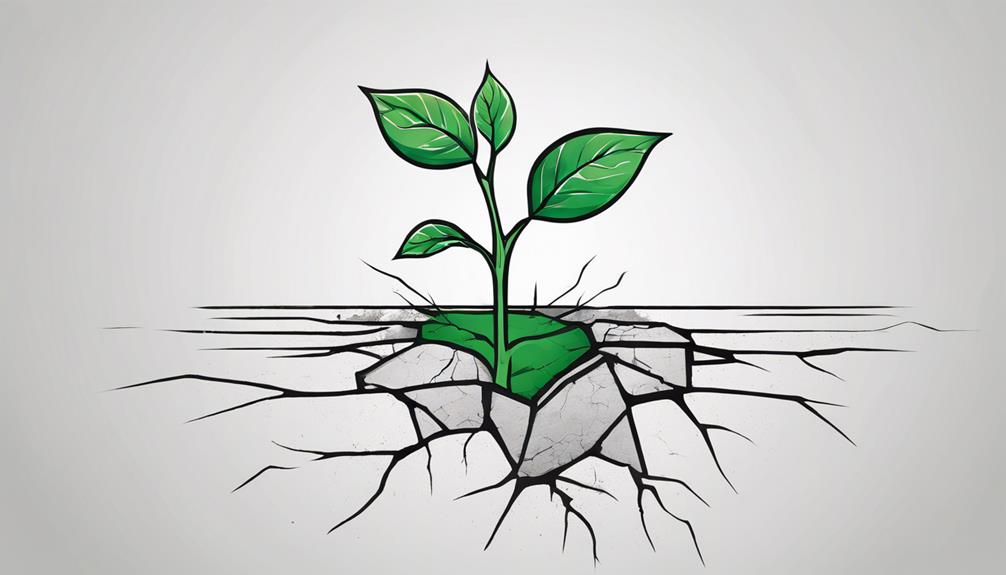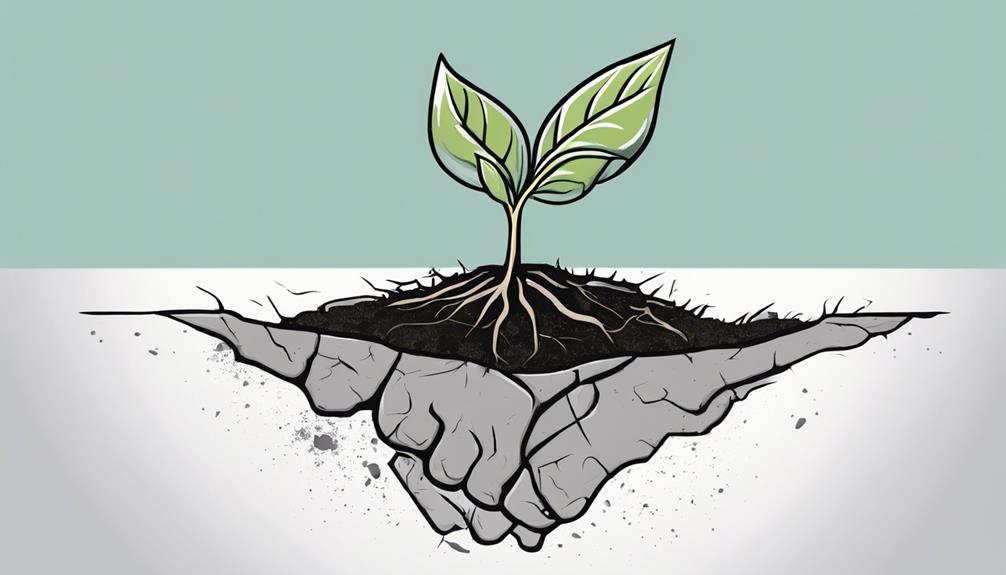The concept of the growth mindset has garnered significant attention in psychological and educational realms due to its profound implications on individuals' learning and development. Rooted in the pioneering work of Dr. Carol Dweck, the growth mindset represents a fundamental belief in one's capacity to enhance abilities and intelligence through persistent effort and resilience. By exploring the intricacies of this mindset, one can uncover a transformative approach to personal growth and achievement.
Key Takeaways
- Embracing challenges and learning from failures are essential in a growth mindset.
- Valuing effort and effective problem-solving strategies over innate talents is crucial.
- Prioritizing hard work and resilience leads to success in a growth mindset.
- Growth mindset fosters continuous improvement, resilience, and achievement in education.
Understanding Growth Mindset

In delving into the concept of growth mindset, it becomes evident that it centers around the belief that abilities are not fixed but can be enhanced through dedicated effort and persistence. This stands in stark contrast to a fixed mindset, where intelligence and talents are viewed as innate and unchangeable. In a growth mindset, individuals are more inclined to embrace challenges and persist in the face of setbacks, understanding that failures are opportunities for learning and improvement. Dr. Carol Dweck's pioneering work on growth mindset highlights the importance of valuing effort and effective strategies for problem-solving over mere talent or intelligence.
Impact on Learning Process
Understanding the impact of a growth mindset on the learning process reveals a significant shift towards valuing effort, support, and effective problem-solving strategies over fixed traits and talents. Embracing a growth mindset in education has profound implications for students' development and achievement. Here are four key ways in which a growth mindset influences the learning process:
- Effort Over Innate Ability: Growth mindset emphasizes the importance of effort and hard work in achieving success, challenging the notion of fixed traits or talents determining one's capabilities.
- Support and Encouragement: Acknowledging and praising students' efforts and improvements, rather than solely focusing on outcomes, nurtures a growth mindset and motivates continuous learning.
- Effective Problem-Solving Strategies: A growth mindset encourages the adoption of effective problem-solving strategies, promoting resilience and perseverance in the face of challenges.
- Continuous Improvement and Resilience: By fostering a growth mindset, educators can help students view setbacks as opportunities for growth, leading to continuous skill development and resilience in the learning process.
Developing a Growth Mindset

Engaging in deliberate practices that challenge fixed mindset thoughts is a fundamental step in the development of a growth mindset. Psychologist Carol Dweck, known for her research on mindset psychology at Stanford University and Harvard Business School, emphasizes the importance of recognizing and addressing fixed mindset tendencies. By engaging in dialogue with a growth mindset voice, individuals can become more adept at identifying and challenging thoughts rooted in a fixed mindset.
Seeking external support for encouragement is another effective strategy for fostering the development of a growth mindset. Surrounding oneself with individuals who exhibit a growth mindset can provide valuable motivation and reinforcement. Additionally, practicing in challenging situations is essential for strengthening a growth mindset. By stepping outside of one's comfort zone and confronting obstacles head-on, individuals can cultivate resilience and a belief in their capacity for growth.
Moreover, recognizing the power of choice is a key aspect of developing a growth mindset. Understanding that one has the ability to choose their responses and actions empowers individuals to approach challenges with a constructive and growth-oriented mindset. Listening to the mindset voice within is crucial for embracing a growth mindset, as it allows individuals to self-reflect and adjust their perspectives towards learning and development.
Benefits of Growth Mindset
Embracing challenges and failures as opportunities for growth and development is a hallmark benefit of adopting a growth mindset. This mindset fosters a new way of approaching obstacles, seeing them not as insurmountable barriers but as chances to learn and improve. By developing a growth mindset, individuals are more inclined to put in the hard work necessary to overcome challenges, leading to personal and professional growth.
Benefits of a Growth Mindset:
- Increased Motivation: Individuals with a growth mindset are motivated by the prospect of learning and developing, driving them to persist in the face of difficulties.
- Resilience: This mindset equips individuals with the resilience needed to bounce back from setbacks, viewing them as temporary obstacles rather than permanent failures.
- Openness to Learning: Those with a growth mindset have a willingness to learn from their mistakes, making adjustments and improvements based on feedback.
- Improved Performance: Through hard work and a focus on growth, individuals with a growth mindset often achieve higher levels of performance and success in various areas of their lives.
Overcoming Fixed Mindset

Transitioning from a fixed mindset to a growth mindset necessitates a fundamental shift in perceptions regarding intelligence and capabilities. Fixed mindsets, which focus on innate abilities, can hinder personal growth by discouraging individuals from embracing challenges and viewing failures as opportunities for learning. To overcome a fixed mindset, individuals must cultivate a growth mindset by valuing effort and persistence in the face of setbacks. Those with fixed mindsets often avoid challenges that could potentially lead to failure, whereas individuals with growth mindsets see challenges as a chance to learn and improve.
To work towards improving from a fixed mindset to a growth mindset, it is essential to change beliefs about intelligence and abilities. This involves understanding that intelligence and abilities can be developed through dedication and hard work. By embracing challenges, persisting in the face of obstacles, and viewing failures as opportunities for growth, individuals can gradually shift from a fixed mindset to a more adaptive and resilient growth mindset.
Growth Mindset in Education
Cultivating a growth mindset in the realm of education underscores the belief that students' abilities are malleable and can be enhanced through dedicated effort and perseverance. Embracing this mindset in educational settings has profound implications:
- Effort and Dedication: Growth mindset in education emphasizes that abilities can be developed through consistent effort and dedication rather than innate talent alone.
- Embracing Challenges: Students with a growth mindset are more likely to embrace challenges, seeing them as opportunities for growth rather than threats to their abilities.
- Feedback for Improvement: Encouraging a growth mindset entails teaching students to seek and value feedback as a tool for improvement, fostering a continuous learning process.
- Motivation and Achievement: Cultivating a growth mindset in students leads to increased motivation, resilience, and ultimately, higher levels of achievement, as they are more willing to take on challenges and engage meaningfully in their learning experiences.
Cultivating Growth Mindset

Developing a growth mindset involves actively seeking challenges and treating failures as opportunities for personal advancement. Embracing challenges with a positive mindset is essential for fostering growth. Individuals cultivating a growth mindset understand that setbacks and failures are not indicators of their abilities but rather opportunities to learn and improve. They actively seek feedback from others to enhance their skills and knowledge, recognizing that constructive criticism contributes to personal development. By being inspired by the success of others, individuals can cultivate motivation to continuously work on new skills and strive for improvement. This positive mindset not only leads to increased motivation but also fosters resilience in the face of obstacles. Those with a growth mindset are more willing to take on new challenges, viewing them as opportunities for growth rather than threats to their abilities. In summary, cultivating a growth mindset involves actively seeking opportunities to work on new skills, maintaining a positive mindset, and embracing challenges as avenues for personal development.
Growth Mindset for Success
When considering the correlation between a growth mindset and achieving success, it becomes evident that embracing this mindset is pivotal for individuals striving for personal and professional accomplishments. A growth mindset fosters increased motivation and resilience, essential qualities for navigating the path to success. Success attained through determination and discipline is a hallmark of individuals with a growth mindset, as they understand that effort and perseverance are key factors in achieving their goals. Overcoming obstacles with hard work and a belief in one's ability to improve is a fundamental benefit of embracing a growth mindset. Additionally, setbacks are viewed as temporary challenges rather than permanent failures, highlighting the importance of resilience in the face of adversity. By cultivating a growth mindset, individuals can enhance their chances of success both at institutions like WGU and throughout their career journeys.
Frequently Asked Questions
What Is Meant by Growth Mindset?
A growth mindset refers to the belief that one's abilities and intelligence can be developed through effort and strategic approaches. This mindset values dedication and hard work over innate talent, encouraging individuals to embrace challenges and view failures as opportunities for growth and learning. By focusing on progress, improvement, and the process of learning, individuals with a growth mindset cultivate resilience, motivation, and a willingness to tackle new challenges for personal and academic growth.
What Is the Growth Mindset Summary?
The growth mindset, a psychological concept, emphasizes the belief that abilities can be developed through dedication and persistence. Its application spans various domains, leading to benefits such as heightened motivation, resilience, and improved relationships. Research underscores the positive impact of a growth mindset on academic and professional achievements. By challenging fixed mindset tendencies, setting learning-oriented goals, and seeking feedback, individuals can cultivate a growth mindset for continuous personal and professional development.
What Is a True Growth Mindset?
A true growth mindset involves fostering a mentality of continuous improvement and resilience. Individuals with such a mindset embrace challenges as opportunities for development, learn from failures to enhance their skills, and believe that intelligence and abilities can be cultivated through effort and perseverance. Cultivating a genuine growth mindset leads to increased motivation, resilience, and a willingness to tackle new challenges for personal growth and development.
What Is a Growth Mindset Goal?
Setting goals in line with a growth mindset involves prioritizing progress, learning, and skill development. Individuals with growth mindset goals are focused on achieving success through continuous improvement and personal development. This mindset fosters motivation by emphasizing effort, resilience, and the belief in one's ability to improve. Challenges are embraced, and setbacks are viewed as opportunities for learning and advancement, driving individuals towards their desired outcomes with a positive and proactive mindset.
Conclusion
In conclusion, embracing a growth mindset is akin to planting seeds of potential that blossom into resilient trees of achievement. By viewing challenges as opportunities for growth, individuals can cultivate a mindset that fosters continuous improvement, resilience, and success. Just as a gardener tends to their garden with care and dedication, nurturing a growth mindset requires dedication, effort, and a belief in one's ability to develop skills and intelligence. Embrace the growth mindset, and watch yourself flourish.
